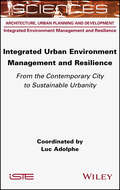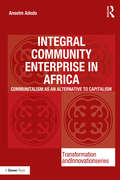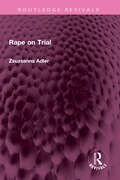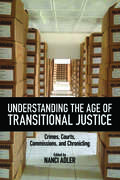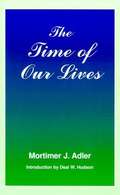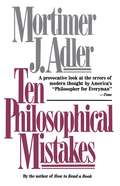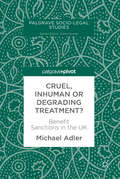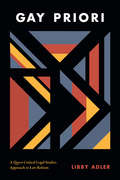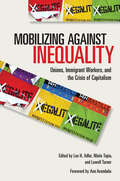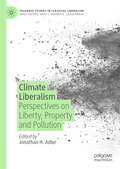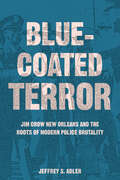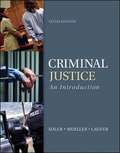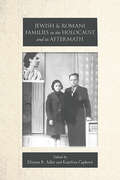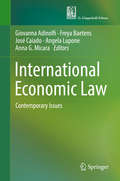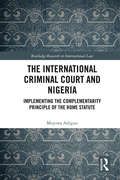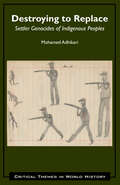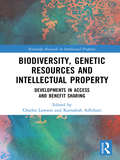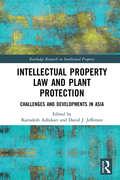- Table View
- List View
Integrated Urban Environment Management and Resilience: From the Contemporary City to Sustainable Urbanity
by Luc AdolpheIntegral Community Enterprise in Africa: Communitalism as an Alternative to Capitalism (Transformation and Innovation)
by Anselm AdodoAt a time of global economic crisis and disillusionment with capitalism, Adodo offers refreshing and positive insight into a more integral way of business management, enterprise and community development as well as holistic healing in Africa. For over three decades, Africa was the recipient of billions of dollars in aid funds that were meant to catapult the continent from undeveloped to developed status. Yet the more the aid poured in, the poorer African countries became. The devastating effect of western economic models in Africa that followed is well documented. Integral Community Enterprise in Africa exposes the limitations of existing theories, such as capitalism, socialism and communism, and shows how western theories were imposed on Africa. Such imposition of concepts and ideas is not only demeaning but also unsustainable, serving only the interest of the elite. Father Anselm Adodo argues for the need to have a southern theory to serve as an alternative to western theories. The majority of African intellectuals and activists, while criticizing existing theories, often do not provide alternative theories to address the prevalent inadequacies entrenched in conventional social, political and economic systems. This revolutionary book aims to address this lapse and proposes the theory of communitalism as a more indigenous, sustainable and integral approach to tackling the social, political, economic and developmental challenges of today’s Africa. There is an African alternative to capitalism, socialism and communism – a surer path to sustainable development in and from Africa. This is a book that is positioned at the very core of a much needed African Renaissance. A profoundly new approach to development in Africa, this is essential reading for anyone concerned with authentic development in Africa and in the world.
Rape on Trial (Routledge Revivals)
by Zsuzsanna AdlerFirst published in 1987, Rape on Trial investigates the impact of the Sexual Offences (Amendment) Act, 1976 and considers the treatment of rape victims by the courts in United Kingdom. Extracts from trials are used extensively, and the author examines in particular: how the anonymity provisions have worked out in practice; how far the victim’s previous sexual history is brought up in court; how far she is held to be responsible for her victimisation; ways in which the validity of her complaint is questioned in court; and defence strategies to present her as a legitimate victim. Also included are a critical discussion of the controversial question of sentencing for rape, and new proposals for legislative and procedural change. Extremely pertinent to current times, this book will be of interest to students of law, criminology, sociology as well as to any concerned citizen.
The Clean Water Act 20 Years Later
by Robert W. Adler Diane M. Cameron Jessica C. LandmanThis volume explores the issues associated with the complex subject of water quality protection in an assessment of the successes and failures of the Clean Water Act over the past twenty years. In addition to examining traditional indicators of water quality, the authors consider how health concerns of the public have been addressed, and present a detailed examination of the ecological health of our waters. Taken together, these measures present a far more complete and balanced picture than raw water quality data alone.As well as reviewing past effectiveness, the book includes specific recommendations for the reauthorization of the Act, which is to be considered by Congress in 1995. This balanced and insightful account will surely shape the debate among legislative and policy experts and citizen activists at all levels who are concerned with issues of water quality.
Understanding the Age of Transitional Justice: Crimes, Courts, Commissions, and Chronicling (Genocide, Political Violence, Human Rights)
by Nanci Adler Vladimir Petrovic William A. Schabas Jeremy Sarkin Stephan Parmentier Mina Rauschenbach Maarten Van Craen Richard Ashby Wilson Thijs B Bouwknegt Nicole L Immler Christian Axboe Nielsen Timothy Williams Kjell AndersonSince the 1980s, an array of legal and non-legal practices—labeled Transitional Justice—has been developed to support post-repressive, post-authoritarian, and post-conflict societies in dealing with their traumatic past. In Understanding the Age of Transitional Justice, the contributors analyze the processes, products, and efficacy of a number of transitional justice mechanisms and look at how genocide, mass political violence, and historical injustices are being institutionally addressed. They invite readers to speculate on what (else) the transcripts produced by these institutions tell us about the past and the present, calling attention to the influence of implicit history conveyed in the narratives that have gained an audience through international criminal tribunals, trials, and truth commissions. Nanci Adler has gathered leading specialists to scrutinize the responses to and effects of violent pasts that provide new perspectives for understanding and applying transitional justice mechanisms in an effort to stop the recycling of old repressions into new ones.
The Time Of Our Lives: The Ethics Of Common Sense
by Mortimer J. Adler Deal HudsonIs it a good time to be alive? Is ours a good society to be alive in? Is it possible to have a good life in our time? And finally, does a good life consist of having a good time? Are happiness and "a good life" interchangeable? These are the questions that Mortimer Adler addresses himself to. The heart of the book lies in its conception of the good life for man, which provides the standard for measuring a century, a society, or a culture: for upon that turns the meaning of each man's primary moral right - his right to the pursuit of happiness. The moral philosophy that Dr. Adler expounds in terms of this conception he calls "the ethics of common sense," because it is as a defense and development of the common-sense answer to the question "can I really make a good life for myself?"
Ten Philosophical Mistakes
by Mortimer J. AdlerExamines ten errors in modern thought and shows how they have led to serious consequences in our everyday lives. Tells how they came about, how to avoid them, and how to counter their negative effects.
Cruel, Inhuman or Degrading Treatment?: Benefit Sanctions in the UK (Palgrave Socio-Legal Studies)
by Michael AdlerThe book subjects the largely hidden phenomenon of benefit sanctions in the UK to sustained examination and critique. It comprises twelve chapters dealing with the terms ‘cruel’, ‘inhuman’ and ‘degrading’ that are used as a benchmark for assessing benefit sanctions; benefit sanctions as a matter of public concern; the historical development of benefit sanctions in the UK; changes in the scope and severity of benefit sanctions; conditionality and the changing relationship between the citizen and the state; the impact and effectiveness of benefit sanctions; benefit sanctions and administrative justice; the role of law in protecting the right to a social minimum; a comparison of benefit sanctions with court fines; benefit sanctions and the rule of law; and what, if anything, can be done about benefit sanctions. Each chapter ends with a paragraph that attempts to highlight the most salient points in that chapter, and the book ends with a short conclusion in which benefit sanctions are assessed against the chosen benchmark.
Gay Priori: A Queer Critical Legal Studies Approach to Law Reform
by Libby AdlerLibby Adler offers a comprehensive critique of the mainstream LGBT legal agenda in the United States, showing how LGBT equal rights discourse drives legal advocates toward a narrow array of reform objectives that do little to help the lives of the most marginalized members of the LGBT community.
Mobilizing against Inequality: Unions, Immigrant Workers, and the Crisis of Capitalism
by Lee H. Adler Maite Tapia Ana Avendaño Lowell TurnerAmong the many challenges that global liberalization has posed for trade unions, the growth of precarious immigrant workforces lacking any collective representation stands out as both a major threat to solidarity and an organizing opportunity. Believing that collective action is critical in the struggle to lift the low wages and working conditions of immigrant workers, the contributors to Mobilizing against Inequality set out to study union strategies toward immigrant workers in four countries: Germany, France, the United Kingdom, and United States. Their research revealed both formidable challenges and inspiring examples of immigrant mobilization that often took shape as innovative social countermovements.Using case studies from a carwash organizing campaign in the United States, a sans papiers movement in France, Justice for Cleaners in the United Kingdom, andintegration approaches by the Metalworkers Union in Germany, among others, the authors look at the strategies of unions toward immigrants from a comparative perspective. Although organizers face a different set of obstacles in each country, this book points to common strategies that offer promise for a more dynamic model of unionism is the global North. The editors have also created a companion website for the book, which features literature reviews, full case studies, updates, and links to related publications. Visit it at www.mobilizing-against-inequality.info.Contributors: Lee H. Adler, Cornell University; Gabriella Alberti, Leeds University; Daniel B. Cornfield, Vanderbilt University; Michael Fichter, Global Labour University, Berlin; Janice Fine, Rutgers, The State University of New Jersey; Jane Holgate, Leeds University; Denisse Roca-Servat, Pontifical Bolivarian University, Colombia; Maite Tapia, Michigan State University; Lowell Turner, Cornell University.
Climate Liberalism: Perspectives on Liberty, Property and Pollution (Palgrave Studies in Classical Liberalism)
by Jonathan H. AdlerClimate Liberalism examines the potential and limitations of classical-liberal approaches to pollution control and climate change. Some successful environmental strategies, such as the use of catch-shares for fisheries, instream water rights, and tradable emission permits, draw heavily upon the classical liberal intellectual tradition and its emphasis on property rights and competitive markets. This intellectual tradition has been less helpful, to date, in the development or design of climate change policies. Climate Liberalism aims to help fill the gap in the academic literature examining the extent to which classical-liberal principles, including an emphasis on property rights, decentralized authority and dynamic markets, can inform the debate over climate-change policies. The contributors in this book approach the topic from a range of perspectives and represent multiple academic disciplines. Chapters consider the role of property rights and common-law legal systems in controlling pollution, the extent to which competitive markets backed by legal rules encourage risk minimization and adaptation, and how to identify the sorts of policy interventions that may help address climate change in ways that are consistent with liberal values.
Forensic Psychology: Concepts, Debates and Practice
by Joanna R. Adler Jacqueline M GrayThis book brings together academics, practitioners and experts in the field of forensic psychology to demonstrate the scope of the discipline and push its parameters. Its aim is to go beyond introductory texts to challenge perceptions, to raise questions for research and to pose problems for practice. The editors hope to inspire and stimulate debate about how forensic psychology can aid the practice of justice. The book is divided into six sections, addressing key topics from the discipline: investigation and prosecution; testimony and evidence; serious and persistent offending; treatment as intervention; intervention and prevention and punishment and corrections. The contributors are drawn from the UK, the USA and Australia.This updated, revised and significantly expanded edition develops the picture of diversity and depth of forensic psychology; considers ways in which the discipline has progressed and identifies challenges for its future sustainability and growth. includes a new section on treatment as intervention with contributions on personality disordered offenders; anger control group work with forensic psychiatric inpatients; and developments in treatment for drug misuse offenders additional chapters throughout including contributions on UK police interviews; the investigation and prosecutoin of rape; the effect of gender in the courtroom; forensic psychology and terrorism; the aetiology of genocide; self harm in prisons; post-corrections reintegration and many more an innovative textbook on forensic psychology exploring application of the subject and setting forensic psychology in a broader context demonstrates ways in which forensic psychology can aid the practice of criminal justice This book will be essential reading for students of forensic psychology and practitioners working in the field.
Bluecoated Terror: Jim Crow New Orleans and the Roots of Modern Police Brutality
by Jeffrey S. AdlerA searing chronicle of how racist violence became an ingrained facet of law enforcement in the United States. Too often, scholars and pundits argue either that police violence against African Americans has remained unchanged since the era of slavery or that it is a recent phenomenon and disconnected from the past. Neither view is accurate. In Bluecoated Terror, Jeffrey S. Adler draws on rich archival accounts to show, in narrative detail, how racialized police brutality is part of a larger system of state oppression with roots in the early twentieth-century South, particularly New Orleans. Wide racial differentials in the use of lethal force and beatings during arrest and interrogation emerged in the 1930s and 1940s. Adler explains how race control and crime control blended and blurred during this era, when police officers and criminal justice officials began to justify systemic violence against Black people as a crucial—and legal—tool for maintaining law and order. Bluecoated Terror explores both the rise of these law-enforcement trends and their chilling resilience, providing critical context for recent horrific police abuses as the ghost of Jim Crow law enforcement continues to haunt the nation.
Criminal Justice: An Introduction 6th Edition
by Freda Adler Gerhard O. W. Mueller William S. LauferCriminal Justice: An Introduction offers a current, lively and thorough introduction to criminal justice. Students are easily drawn to the intriguing field with coverage of past developments, contemporary issues, and tomorrow's challenges. This edition offers new material on diversity in the Criminal Justice System to help students better understand the system from the perspective of women and minorities. Manageable in terms of size and price, Criminal Justice: An Introduction offers a concise and affordable option to your Criminal Justice course.
Jewish and Romani Families in the Holocaust and its Aftermath
by Eliyana R. Adler Natalia Aleksiun Viktoria Banyai Laura Hobson Faure Robin Judd Dalia Ofer Anja Reuss Helena Sadílková Joachim Schlör Michal Unger Sarah Wobick-Segev Katerina Capková Volha BartashDiaries, testimonies and memoirs of the Holocaust often include at least as much on the family as on the individual. Victims of the Nazi regime experienced oppression and made decisions embedded within families. Even after the war, sole survivors often described their losses and rebuilt their lives with a distinct focus on family. Yet this perspective is lacking in academic analyses. In this work, scholars from the United States, Israel, and across Europe bring a variety of backgrounds and disciplines to their study of the Holocaust and its aftermath from the family perspective. Drawing on research from Belarus to Great Britain, and examining both Jewish and Romani families, they demonstrate the importance of recognizing how people continued to function within family units—broadly defined—throughout the war and afterward.
Congress and the Politics of Problem Solving
by E. Scott Adler John D. WilkersonHow do issues end up on the agenda? Why do lawmakers routinely invest in program oversight and broad policy development? What considerations drive legislative policy change? For many, Congress is an institution consumed by partisan bickering and gridlock. Yet the institution's long history of addressing significant societal problems – even in recent years – seems to contradict this view. Congress and the Politics of Problem Solving argues that the willingness of many voters to hold elected officials accountable for societal conditions is central to appreciating why Congress responds to problems despite the many reasons mustered for why it cannot. The authors show that, across decades of policy making, problem-solving motivations explain why bipartisanship is a common pattern of congressional behavior and offer the best explanation for legislative issue attention and policy change.
Chesterfield Smith, America's Lawyer
by Mary E. AdkinsChesterfield Smith spearheaded the American Bar Association’s condemnation of Richard M. Nixon during the Watergate scandal. Smith’s damning statement “No man is above the law” turned him into a national figure. But his outsized accomplishments, and equally outsized personality, had already made the Florida attorney a legend in his home state.Mary Adkins’s biography follows the epic life of a person driven by the motto “do good.” A child of the rural South turned war hero, Smith put himself through law school and rose fast to lead the Florida Bar and mastermind the drafting of a new state constitution. At the same time, he grew his small firm into Holland & Knight, a legal leviathan he imbued with his own sense of public duty. His idealism further manifested in his hiring of women and people of color while his expansive professional network led to a close friendship with future Supreme Court justice Ruth Bader Ginsburg. Adkins also examines Smith’s mentoring of several outstanding legal figures and the community service organizations still influenced by his humane vision of the law.Fully realized and long overdue, Chesterfield Smith, America’s Lawyer illuminates the complexities of a defining Florida figure who became a legal giant.
50 Real Law School Personal Statements: And Everything You Need To Know To Write Yours
by Mary AdkinsPersonal statements are of vital importance to any law school application. This book provides expert guidance on what the ideal essay should look like and how to write it. What qualities characterize a winning personal statement? How does a mediocre personal statement become one that leads to acceptance at a top law school? In this one of a kind collection, jdMission's senior consultants review and critique 50 real personal statements by law school applicants. If you've ever wondered what other people are writing in their law school personal statements and how they measure up, this book is for you. If you are looking for a guide on how to write your own personal statement, this book will leave you with 50 key tips coupled with real-world examples. If you are searching for a topic idea, this book has 50 of them.
The Dog Who Couldn't Wag his Tail
by Linda AdkinsWhen his rescuer saw him on the side of the road, the poor swollen dog, needed a lot of help. He had terrible ear mites, and no hair except for a couple of tufts on his face. The dog could not even wag his tail. But with some kind caring vets and a chance to get better [and] learn a few tricks, "Mighty Mite," a golden retriever mix, was able to make a difference as a blood donor for other animals in need and as a therapy dog. This is his true story.
International Economic Law
by Giovanna Adinolfi Freya Baetens José Caiado Angela Lupone Anna G. MicaraThis volume scrutinises the main challenges faced by States in their current international economic relations from an interdisciplinary perspective. It combines legal research with political and economic analysis and favours dialogue among scientific disciplines. Readers are offered a series of in-depth studies on a rich variety of topics: how to reconcile States' interest to benefit from economic liberalization with their need to pursue social goals (such as the protection of human rights or of the environment); recent developments under WTO law and regional integration processes; international cooperation in the energy sector; national regulatory developments in the banking sector, sovereign wealth funds and investor-State arbitration.
The International Criminal Court and Nigeria: Implementing the Complementarity Principle of the Rome Statute (Routledge Research in International Law)
by Muyiwa AdigunIf Nigeria fails to prosecute the crimes recognised under the Rome Statute, then the International Criminal Court (ICC) will intervene. The ICC is only expected to complement the criminal justice system in Nigeria and is not a court of first instance, but one of last resort. This is what is known as the principle of complementarity. Before the ICC can step in, it must make a finding of ‘unwillingness’ or ‘inability’ on the part of Nigeria. It is only after this finding is made that the ICC can take over the prosecution of the crimes recognised under the Statute from Nigeria. This book examines the criminal justice process in Nigeria and discovers that the justice system is latent with the requirements of ‘unwillingness’ and ‘inability.’ The requirements, which serve as tests for assessment, are as they are laid down by the Rome Statute and interpreted by the ICC. This book offers recommendations as to what Nigeria must do in order to avoid the ICC intervention by reversing those parameters that give rise to ‘unwillingness’ and ‘inability.’ The International Criminal Court and Nigeria: Implementing the Complementarity Principle of the Rome Statute offers a contribution to the advancement of international law and will be of practical use to African countries. It aims to sensitise policy makers in different African countries in respect of policy options open to them to close impunity gap in their respective countries. This volume addresses the topics with regard to international criminal law and comparative public law and will be of interest to researchers, academics, organizations, and students in the fields of international law, governance, and comparative criminal justice.
Destroying to Replace: Settler Genocides of Indigenous Peoples (Critical Themes in World History)
by Mohamed Adhikari"This book explores settler colonial genocides in a global perspective and over the long durée. It does so systematically and compellingly, as it investigates how settler colonial expansion at times created conditions for genocidal violence, and the ways in which genocide was at times perpetrated on settler colonial frontiers. This volume will prove invaluable to teachers and students of imperialism, colonialism, and human rights."—Lorenzo Veracini, Swinburne University of Technology, and author of The World Turned Inside Out: Settler Colonialism as a Political Idea
Legal Regulation of Private Actors in Outer Space: India’s Role
by Malay AdhikariThe book addresses legal issues and challenges in using Space Technology. Especially covered are the provisions of International Space Law and few national space legislations to regulate private actors in outer space. The key chapters covered are history of space regulations, private actors in space, legal issues for such actors, regulating these issues outside India, and the same in India. In concluding chapter, the author has worked out some recommendations.The book would be of immense use to people especially startups in private space industry; students, faculties and scholars of Space Law and Policy, Space Security, Defence and Security Studies.Please note: Taylor & Francis does not sell or distribute the Hardback in India, Pakistan, Nepal, Bhutan, Bangladesh and Sri Lanka
Biodiversity, Genetic Resources and Intellectual Property: Developments in Access and Benefit Sharing (Routledge Research in Intellectual Property)
by Kamalesh Adhikari Charles LawsonDebates about Access and Benefit Sharing (ABS) have moved on in recent years. An initial focus on the legal obligations established by international agreements like the United Nations Convention on Biological Diversity and the form of obligations for collecting physical biological materials have now moved to a far more complex series of disputes and challenges about the ways ABS should be implemented and enforced: repatriation of resources, technology transfer, traditional knowledge and cultural expressions; open access to information and knowledge, naming conventions, farmers’ rights, new schemes for accessing pandemic viruses and sharing DNA sequences, and so on. Unfortunately, most of this debate is now crystallised into apparently intractable discussions such as implementing the certificates of origin, recognising traditional knowledge and traditional cultural expression as a form of intellectual property, and sovereignty for Indigenous peoples. Not everything in this new marketplace of ABS has been created de novo. Like most new entrants, ABS has disrupted existing legal and governance arrangements. This collection of chapters examines what is new, what has been changed, and what might be changed in response to the growing acceptance and prevalence of ABS of genetic resources. Biodiversity, Genetic Resources and Intellectual Property: Developments in Access and Benefit Sharing of Genetic Resources addresses current issues arising from recent developments in the enduring and topical debates about managing genetic resources through the ABS regime. The book explores key historical, doctrinal, and theoretical issues in the field, at the same time developing new ideas and perspectives around ABS. It shows the latest state of knowledge and will be of interest to researchers, academics, policymakers, and students in the fields of intellectual property, governance, biodiversity and conservation, sustainable development, and agriculture.
Intellectual Property Law and Plant Protection: Challenges and Developments in Asia (Routledge Research in Intellectual Property)
by Kamalesh Adhikari David J. JeffersonThis book is the first to provide a detailed and critical account of the emergence, development, and implementation of plant variety protection laws in Asian countries. Each chapter undertakes a critical socio-legal analysis of one or more legal frameworks to understand, evaluate, and explore the concerns of diverse national stakeholders, the histories and dynamics of law-making, and the ways in which plant variety protection and seed certification laws interact with local agricultural systems. The book also assesses how Asian countries can capitalise on the ‘unused policy space’ in international agreements such as the Agreement on Trade-Related Aspects of Intellectual Property Rights and the International Convention for the Protection of New Varieties of Plants, as well as international obligations beyond these, such as those contained in the Convention on Biological Diversity and the Plant Treaty. It also highlights the many ways in which Asian experiences can offer new insights into the relationship between intellectual property and plants, and how relevant laws might be re-imagined in other regions, including Africa, Europe, and the Americas. By adding an important new perspective to the ongoing debate on intellectual property and plants, this book will appeal to academics, practitioners, and policy-makers engaged in work surrounding intellectual property laws, agricultural biodiversity, and plant breeding.
